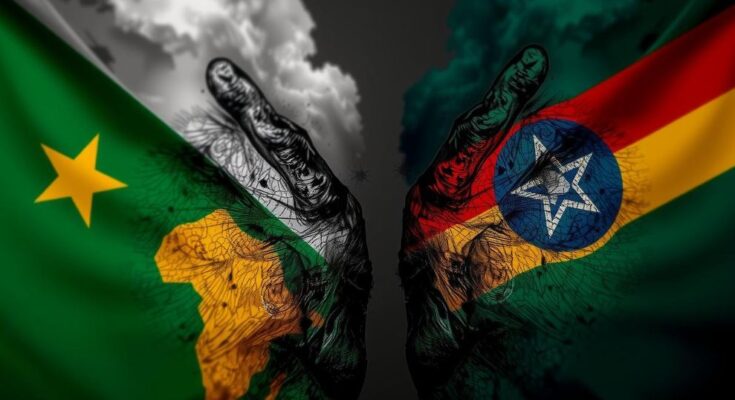The diplomatic tensions between Somalia and Ethiopia have escalated with the recent expulsion of Ethiopian diplomat Ali Mohamed Adan by Somalia, citing interference in domestic affairs. This incident is part of a broader pattern of strained relations, exacerbated by Ethiopia’s agreements with Puntland and Somaliland, and has prompted Somalia to strengthen alliances with Egypt and Turkey amidst these developments.
The ongoing diplomatic discord between Somalia and Ethiopia escalated recently when Somalia’s Foreign Ministry officially ordered the expulsion of Ali Mohamed Adan, a senior Ethiopian diplomat, from Mogadishu. This decision, communicated on Tuesday, was precipitated by allegations of interference in Somalia’s internal political matters, marking a significant step towards increasing tensions between the two neighboring nations. Somalia’s Foreign Ministry issued a statement asserting that Counselor Adan had engaged in conduct inconsistent with his diplomatic responsibilities, thereby rendering him persona non grata. The ministry cited specific violations of the Vienna Convention on Diplomatic Relations, particularly emphasizing the articles which require diplomats to respect the host nation’s territorial integrity and avoid meddling in its internal affairs. While precise details regarding Adan’s alleged misconduct were not disclosed, this incident follows a pattern of diplomatic friction between the two countries. Earlier in April, Somalia’s government expelled Ethiopia’s ambassador and shut down Ethiopian diplomatic missions in Somalia’s breakaway region of Somaliland and the semi-autonomous Puntland, citing similar reasons of diplomatic overreach by Ethiopia. At the core of these diplomatic strains lies Ethiopia’s attempts to strengthen ties with Puntland, particularly after Puntland declared it no longer recognized the Somali federal government’s authority, a development that occurred following constitutional changes in March. On April 3, Ethiopia signed a cooperative agreement with Puntland, which Somalia perceived as a direct infringement on its sovereignty. Furthermore, Somalia’s officials alleged that Puntland had received unsanctioned military supplies from Ethiopia, exacerbating tensions. Ethiopia’s earlier agreements with Somaliland also play a pivotal role in the deteriorating relations. A January 1 agreement granted Ethiopia military and commercial access to a coastal region in Somaliland, which remains diplomatically unrecognized, in exchange for acknowledging Somaliland’s separate status. Despite not being enacted, this agreement signified Ethiopia’s growing support for Somaliland, which has historically been at odds with the central Somali government. Amidst these developments, Somalia has sought to bolster its security alliances, forging closer ties with its neighbors in the Horn of Africa along with Egypt and Turkey. Egypt, facing its grievances with Ethiopia regarding the Grand Ethiopian Renaissance Dam (GERD), has initiated military support for Somalia, including equipment shipments. Notably, Egypt hosted a summit with Somalia and Eritrea on October 10, where they expressed solidarity in defending Somalia’s sovereignty. Conversely, Turkey has increased its military presence in Somalia and facilitated indirect reconciliation talks between Somalia and Ethiopia, although these discussions have stalled. Turkey’s involvement highlights its desire to engage in the geopolitics of the Horn of Africa, partially due to Somalia’s strategic location on key maritime routes.
The diplomatic rift between Somalia and Ethiopia is rooted in historical grievances and contemporary geopolitical dynamics. Somalia has accused Ethiopia of interfering in its domestic affairs, particularly in relation to the semi-autonomous regions of Somaliland and Puntland. This tension has been exacerbated by Ethiopia’s agreements with these regions, which challenge Somalia’s sovereignty. Turkey and Egypt have stepped into this contentious landscape by offering military and diplomatic support to Somalia, further complicating the regional balance of power and highlighting the longstanding disputes between Ethiopia and its neighbors over resources and territorial authority.
The recent expulsion of Ethiopian diplomat Ali Mohamed Adan underscores the intensifying rift between Somalia and Ethiopia, fueled by accusations of interference in internal affairs. This situation reflects broader regional dynamics, where Ethiopia’s diplomatic maneuvers with Somaliland and Puntland have provoked responses from Somalia and its allies, including Egypt and Turkey. As both countries navigate their complex relationships and geopolitical interests, the potential for further escalation remains significant, necessitating careful diplomatic engagement in the region.
Original Source: www.al-monitor.com




